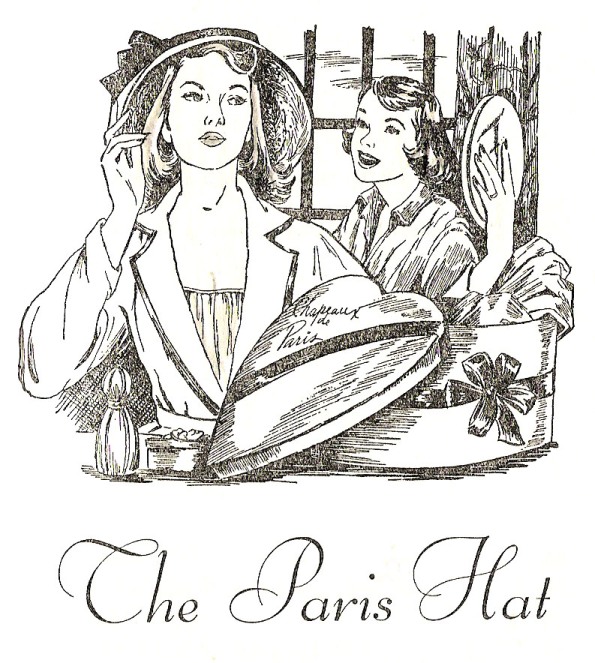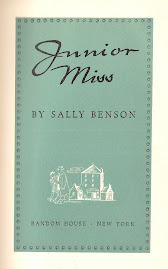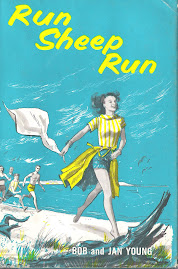 Titles: Then Came November; When Debbie Dared
Titles: Then Came November; When Debbie DaredAuthors: Nan Gilbert; Kathleen Robinson
Publisher: Whitman, 1963
Cover art: Olindo Giancomini; Jim Tadych
Settings: Fairhills, a small town turned suburb; Karidale, a suburb of St. Louis
Provenance: "Helen Snyder" written inside front cover, raised seal on first page "Library of Ernestine L. Snyder."
Fun: homegrown watercress, fear of heights, going deeply into debt for the perfect coat.
Quote: "This is authentic Fraser plaid, woven in Scotland especially for our clan. I believe the firm now offers it for general sale, if your mother is interested in ordering, but whether they maintained the quality of the wool, I couldn't say--" (Then Came November)
"[Merry] was the only girl in Karidale to have ridden to hounds." (When Debbie Dared)
This was an era when class struck terror into the hearts of millions. In book after book, heroines are acutely aware of their social position, marked by such things as Chinese salad bowls, pedigreed dogs, and where they summer, as well as proximity to horses and booze.
In these two Whitman teen novels, Then Came November, and When Debbie Dared, Dulcy Rolff and Debbie Robyne both run up against snaky girls who, while pretending to be their friends, are secretly snobs. In Dulcy's case the motivation is Dulcy's superior social position. Dulcy is not wealthy, but her family bears a pioneer name in the town and gets frequent mention in the society column. As Elaine, the snake, puts it:Publisher: Whitman, 1963
Cover art: Olindo Giancomini; Jim Tadych
Settings: Fairhills, a small town turned suburb; Karidale, a suburb of St. Louis
Provenance: "Helen Snyder" written inside front cover, raised seal on first page "Library of Ernestine L. Snyder."
Fun: homegrown watercress, fear of heights, going deeply into debt for the perfect coat.
Quote: "This is authentic Fraser plaid, woven in Scotland especially for our clan. I believe the firm now offers it for general sale, if your mother is interested in ordering, but whether they maintained the quality of the wool, I couldn't say--" (Then Came November)
"[Merry] was the only girl in Karidale to have ridden to hounds." (When Debbie Dared)
This was an era when class struck terror into the hearts of millions. In book after book, heroines are acutely aware of their social position, marked by such things as Chinese salad bowls, pedigreed dogs, and where they summer, as well as proximity to horses and booze.
"Rolffs don't have to be rich. They don't have to butter people up and pull strings and -- don't you think I get sick, sick of watching Mother do it, every new town we go to?"
Dulcy, previously shy, and not blessed with a lot of foresight (she nearly kills her dog by giving him sleeping pills so he won't bark when she sneaks out) is completely suckered by Elaine, who shows her how to open a charge account ("just give them your father's name") and then, when she is in trouble at home and school, steals her boyfriend.
Debbie, on the other hand, is an ordinary soul taken up by Carlotta, a "New York girl" whose father has been transferred to Debbie's hometown. " 'Personally,' " Carlotta says, "with a twist of golden bare shoulders, 'I think it's gauche to dine early.' " Fortunately, Carlotta mispronounces gauche, and Debbie becomes disillusioned with her. Carlotta is also driven to a jealous fit when another senior girl drops out to marry her fiance, a West Point cadet. (The lucky thing -- she gets to start her married life on an army base in West Germany!) It turns out that she only cultivated Debbie to get her help on her French homework. Carlotta ends up alone and unloved, while Debbie rides the ferris wheel at the state fair with her new boyfriend -- the son of an orthopedic surgeon.
While it might seem that the common folks prevail, in fact neither Dulcy nor Debbie questions that there are certain things one ought to have or aspire to. When Debbie looks over her mother's dinner table before a party, she sees her grandmother's silver candlesticks, Calyx dinner ware, a linen tablecloth and "unmatched flat silver, all old and much of it worn thin." Dulcy, for her part, is comforted by her family's loyalty to anyone in trouble.As for poor familyless Elaine, she and her Mother will evidently have to once again move to a new town and start pushing their way in among the right people.











No comments:
Post a Comment